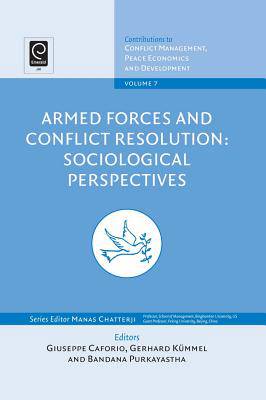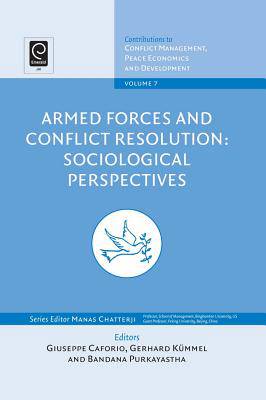
Je cadeautjes zeker op tijd in huis hebben voor de feestdagen? Kom langs in onze winkels en vind het perfecte geschenk!
- Afhalen na 1 uur in een winkel met voorraad
- Gratis thuislevering in België vanaf € 30
- Ruim aanbod met 7 miljoen producten
Je cadeautjes zeker op tijd in huis hebben voor de feestdagen? Kom langs in onze winkels en vind het perfecte geschenk!
- Afhalen na 1 uur in een winkel met voorraad
- Gratis thuislevering in België vanaf € 30
- Ruim aanbod met 7 miljoen producten
Zoeken
Armed Forces and Conflict Resolution
Sociological Perspectives
€ 444,95
+ 889 punten
Omschrijving
The study of armed forces and conflict resolution has undergone important developments at the turn of the millennium, driven by emerging events. The fall of the Berlin Wall, the end of the Cold War, the resurgence of nationalism and religious wars, ethnic cleansing, September Eleven, the War on Terror, and asymmetric warfare, the United Nations' inability to manage and successfully conclude military operations, are so many flash points of how much things have changed since the Cold War. The action of militaries has become more important, more difficult, more controversial, and, at the same time, insufficient, without parallel methods and political actions for resolving conflicts. As scholars conceptions of conflicts have changed, so have their understanding of conflict resolution and peace. This latter scholarship now spans analyses of the role of governments, civil institutions, and organized groups. The studies of building and sustaining peace now span institutional, inter-actional, and interpersonal levels in order to conceptualize a more holistic, long-term vision of peace.This book brings together contributions from scholars of various social science disciplines on three themes that appeared significant for the study of the phenomenon of conflict and conflict resolution. The first theme is centered on the new aspects of war in the twenty-first century where asymmetric warfare has changed many rules of the game, imposing a profound transformation on the military, not only tactical, but also structural, preparatory, mental and ideological.The second theme regards the delicate relations between the armed forces and societies. The ever-greater technicality of military operations and their lower comprehensibility to the broad public as a result, together with increased sensitivity in many countries in regard to the use of violence and death, have created social situations and problems that deserve to be investigated. The third theme, building and sustaining peace, operationalizes different types and levels of violence and conflict. It assesses ongoing efforts, for instance, governments trying to contain or diffuse conflict, businesses and national service schemes building peaceful civil spheres, and the efforts of organized groups to claim, shape, and extend the spheres of life that are free of conflict.
Specificaties
Betrokkenen
- Uitgeverij:
Inhoud
- Aantal bladzijden:
- 556
- Taal:
- Engels
- Reeks:
- Reeksnummer:
- nr. 7
Eigenschappen
- Productcode (EAN):
- 9781848551220
- Verschijningsdatum:
- 15/10/2008
- Uitvoering:
- Hardcover
- Formaat:
- Genaaid
- Afmetingen:
- 155 mm x 231 mm
- Gewicht:
- 725 g

Alleen bij Standaard Boekhandel
+ 889 punten op je klantenkaart van Standaard Boekhandel
Beoordelingen
We publiceren alleen reviews die voldoen aan de voorwaarden voor reviews. Bekijk onze voorwaarden voor reviews.








